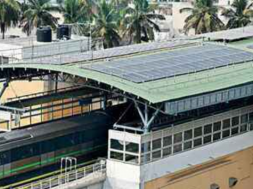
UL, a premier global safety science company, recently held the ‘India Energy Storage Technology Summit’, a knowledge-sharing forum aimed to propel the uptake and development of energy-storage solutions in India.India’s increasing adoption of renewable energy, coupled with a heightening importance accorded to quality of renewable power supplied to the grid, has initiated a serious discussion on energy storage systems. Even as multiple energy storage technologies are vying with each other for acceptance, there are significant safety, convenience and performance challenges to be addressed.
The Summit’s broad spectrum of audience included government officials, policy makers, industry leaders, manufacturers, regulators, trade associations, academicians and technology innovators. Designed to initiate a continual dialogue on energy storage, its related scope and challenges, the Summit emerged as a platform for assimilating global views and expertise on advances in research in energy storage systems and the concurrent standards guiding the safe deployment of these technologies.
Day 1 of the Summit involved an in-depth exploration of emerging cell technologies around the world and their suitability to the Indian market. With renewables becoming more prominent in the country’s energy mix, speakers analyzed the critical role played by energy storage systems in narrowing the gap between generation and supply of renewable power as well as regulating and improving the quality of power flow. Expert- led case studies also unraveled the current status of domestic energy technology projects, the exciting prospects of indigenous production of lithium ion batteries and its associated safety issues.
Dr. P C Pant, Scientist in the, Ministry of New and Renewable Energy remarked, “Though we have surplus power in the country, we are unable to provide electricity to a huge section of population, specifically in far-flung and remote areas. Decentralized electricity generation using renewable energy sources, clubbed with suitable energy storage mechanism, therefore, are being promoted. In addition, the context, in which energy storage is now being discussed, has also changed, as large scale penetration of renewable energy into the grid, may change the entire spectrum of power generation. In this process, we should increase our capacity to absorb and incorporate newer energy storage technologies, which work best for our social, economic and geographical conditions”
Delivering his talk on evaluating the performance and safety considerations of energy storage systems, Dr. Thomas Chapin, Vice President – Research, Underwriters Laboratories Inc. said, “To make societies sustainable in today’s scenario, production and storage of renewable energies is a matter of concern. The prevalence of lithium-ion batteries (LiBs) has created the need to focus on their continued safety. UL has used its unique position as a safety science organization to bring together thought leaders from government and industry to the first ever summit of its kind. With over 122 years of knowledge, we at UL aim at facilitating dialogues, innovation and create policies that help develop the right standards, create strong understanding of the business strategies and regulatory & economic circumstances set to drive continued growth of the energy-storage market for India.”
In light of the government’s contemplation to further the reach of clean energy in the automobile sector, Day 2 of the Summit focused on the market scenario and the road map of energy storage systems for the electric vehicles industry in India. As electric vehicles are largely powered by lithium ion batteries, specialists related to the field expounded upon the performance and the safety considerations involved in the design of lithium ion batteries and electric vehicle charging stations in the country.
On the safety assessment of lithium ion batteries, Dr. Judy Jeevarajan, Research Director – Electrochemical Safety, Underwriters Laboratories Inc. said, “From laptops and cell phones to automobiles and airplanes, lithium-ion batteries have caused several accidents, either on account of carelessness or ignorance of safety requirements. Batteries should be independently fault tolerant and should be able to withstand any fault. We lack a comprehensive set of standards in this regard which will stress the importance of strong testing mechanisms and attention to detail towards all components of the batteries.”
In their concluding remarks, speakers emphasized the need for developing an action plan to harness the potential for energy storage systems in the country in tandem with evolving specific standards to govern safety and quality aspects of these systems. The importance for establishing an Energy Storage Research Institute was also highlighted to develop self-sustenance of storage technologies for the country. As energy storage is an evolving technology, experts also reiterated the need to have regular collaborations such as the India Energy Storage Summit 2016 to ideate upon new developments in the sector.
Key speakers at the event included Dr. Gopu Kumar, Senior Principal Scientist, Central Electro Chemical Research Institute, Dr. Daniel C Abraham, Materials Scientist, Argonne National Laboratory (ANL), USA, Dr. Sajid Mubashir, Member R&D at National Automotive Board (NAB), Department of Heavy Industries and Sohinder Gill, Director-Society of Manufacturers of Electric Vehicles, Dr. PC Pant, Director- ESS, MNRE, Dr. R. Gopalan, Associate Director, ARCI, Dr. Rahul Walawalkar and Debi Prasad Dash, Indian Energy Storage Alliance,.













